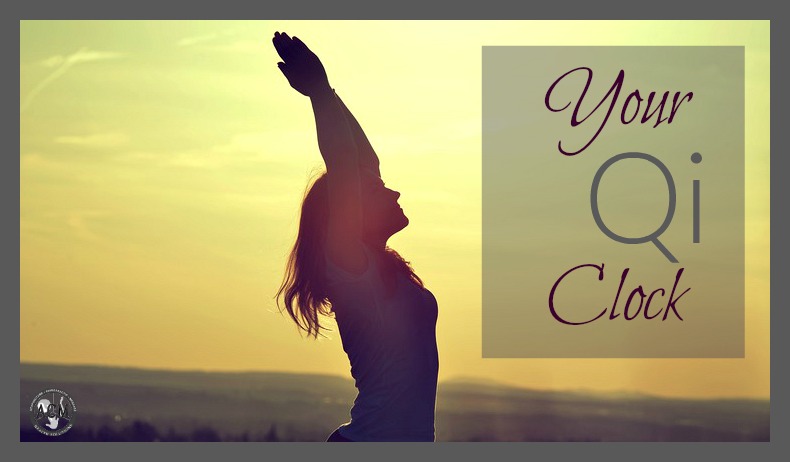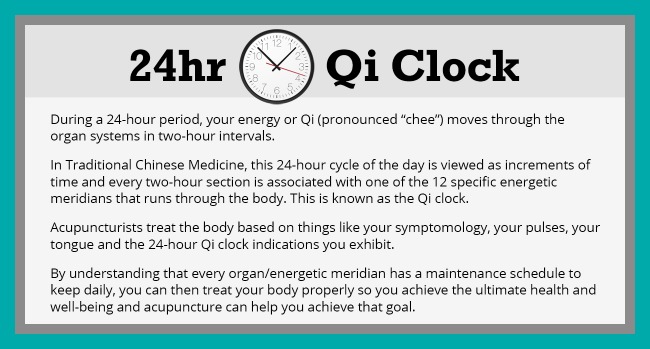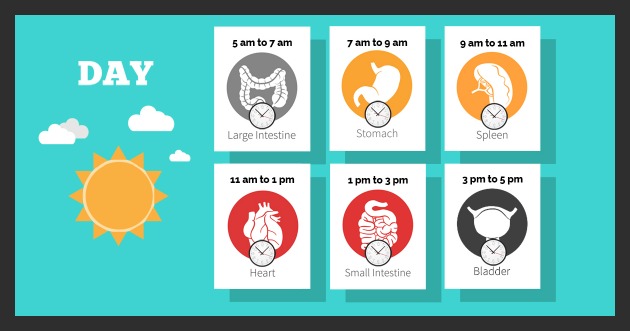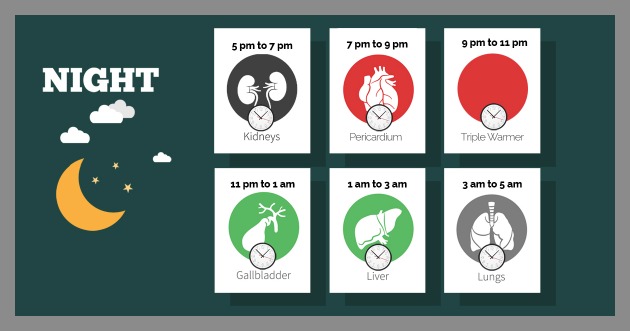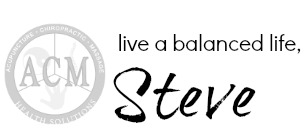-
Book Online Now - Acupuncture Solutions3900 Pebblecreek Ct #101
Plano, TX 75023972-612-4900 - 6501 Wesley St #A-1
Greenville, TX 75402903-213-3679 Learn more about…
#autumn #balance #behappy #fall #familytime #germs #healthlyliving #healthyskin #immunesystem #organs #psoriasis #seasons #sunscreen #thinkpositive acupressure acupuncture allergies anxiety coronavirus covid-19 depression diet digestion energy exercise headaches health heart herbs kidneys liver lungs meditation migraines nutrition pain pms qi sleep spring stress summer tcm Traditional Chinese Medicine winter
Uncategorized
24 Hour Qi Clock
Most people are familiar with the terms diurnal and nocturnal. Diurnal means active during the daytime, while nocturnal means active during the nighttime. Together the two make up a 24-hour cycle known as a day. But, in traditional Chinese medicine, this 24-hour cycle is viewed as much more than just a day in the life. The 24 hours of the day are viewed as increments of time and every two-hour section is associated with a specific energetic meridian that runs through the body. This is known as the Qi clock.
Do you wake up every night or every morning about the same time? Have you ever wondered why? Some people call that an internal clock. In Chinese medicine, this gives a much deeper look into how the body functions though. Chinese medical theory divides the body based upon the 12 energetic meridians. Each of the meridians is assigned a two-hour time slot. For example, the liver meridian is associated with the hours of 1 a.m. to 3 a.m. If you wake up during this time frame, then there is an issue with your liver meridian. So knowing this information can be very important to an acupuncturist/Chinese medicine practitioner.
During a 24-hour period, your energy or Qi (pronounced “chee”) moves through the organ systems in two-hour intervals. Qi draws inward to help restore the body between the hours of 1 a.m. and 3 a.m. The liver cleanses the blood and performs other functions, such as getting the blood ready to travel outward into the rest of the body. Over the next 12 hours, Qi cycles through the organs that assimilate, digest and eliminate food through the body or our diurnal organs. By mid-afternoon, the body begins to slow down again in preparation for the nocturnal phase. The nocturnal phase is all about restoring and maintaining. So when one organ system is at its peak, its counterpart, on the opposite side of the clock is at its lowest point. An example is 7 a.m. to 9 a.m., which are the hours of the stomach. This is when the stomach is at its peak and also why it is recommended to eat a big breakfast. On the opposite side of the clock lies the pericardium, which is associated with the pituitary, hypothalamus and reproductive organs. The pericardium is at its weakest point between the hours of 7 a.m. and 9 a.m.
Here’s a brief summary of the 24 hour qi cycle:
3 a.m. to 5 a.m. is lung time
5 a.m. to 7 a.m. is large intestine time
7 a.m. to 9 a.m. is stomach time
9 a.m. to 11 a.m. is spleen time
11 a.m. to 1 a.m. is heart time
1 p.m. to 3 p.m. is small intestine time
3 p.m. to 5 p.m. is urinary bladder time
5 p.m. to 7 p.m. is kidney time
7 p.m. to 9 p.m. is pericardium time
9 p.m. to 11 p.m. is triple burner time (associated with the thyroid and adrenals)
11 p.m. to 1 a.m. is gall bladder time
1 a.m. to 3 a.m. is liver time
So if you have recurring problems at the same time every day, then there is a good chance that the organ/meridian associated with that time is in distress. This is why traditional Chinese medicine practitioners ask so many questions and also why they look at the body as a whole instead of just one particular organ. By understanding that every organ/energetic meridian has a maintenance schedule to keep daily, you can then treat your body properly so you achieve the ultimate health and well-being and acupuncture can help you achieve that goal. Acupuncturists treat the body based on things like your symptomology, your pulses, your tongue and the 24-hour Qi clock indications you exhibit. The goal is to bring the body back into balance and knowing when the meridians are at their peaks and valleys is a great place to begin.
7 Tips to be Stress-Free During the Holidays
7 Tips to be Stress-Free During the Holidays
Keep a routine
It is especially easy to lose your normal routine during the holidays due to festivities and the special occasions that tend to happen this time of year. Don’t abandon your healthy habits, keep your usual routine of diet and exercise, which is especially important when holiday foods and drinks come around. Try keeping a calendar to keep better track of your schedule.
Prioritize
It is easy to take on too much during this time of year. On top of your normal schedule, there is the obligation to see family, attend gatherings and gift-giving. You can only do so much! Prioritize and don’t be afraid to say no if you simply don’t have enough time to commit to something. The holiday season is busy and overwhelming, but it doesn’t have to be.
Watch the wallet
There is nothing that will stress you out more in the long run than spending too much money during the holidays. Make a budget and stick with it. It is incredibly easy to overspend during this time. Budget and allow yourself to spend a certain amount for the entire season, you’ll thank yourself after the holidays are over.
Make time for yourself
Although it is the season for giving, make sure to make time for yourself too. It can be stressful and overwhelming when you try to constantly please others. It is okay to say no to events that you may feel obligated to go to. One of the most important ways to stay stress-free this season is to give yourself time to relax. Do yoga, read or any other activity you like to do to relax.
Try acupuncture
There is no better time than now to try acupuncture. If you are feeling under the weather, stressed and not at your best health, acupuncture can help. Acupuncture can help lower stress levels, boost your immune system and leave you feeling relaxed. Give it a shot!
Give Back
Volunteer at your local food back or donate to a clothing drive. Giving back to the community is always important, but especially during the holidays. Spending time helping out doesn’t just help others, but can benefit you as well.
Don’t sweat the small things
Holidays are meant for family, friends and for celebration. Don’t sweat the small stuff. This is a time to relax and be thankful for the people in your life. Material objects come and go, but relationships will be there and are the most important thing of all. Put your job and your stress on the back-burner for a bit and enjoy the people who mean the most around you.
7 Acupuncture Tips for a Healthy Fall | AcuTake
 Fall is right around the corner.
Fall is right around the corner.
New seasons are an opportunity to assess our states of health and realign with our natural rhythms.
From an acupuncture perspective, fall is about refinement. It’s time to pare down, to let go of the excesses we allowed ourselves in summer and focus on what’s necessary for winter.
In acupuncture theory, humans are viewed as microcosms of the natural world that surrounds them. Weather and climate, particularly during the transition from one season to another, factor significantly into acupuncture diagnoses and treatment plans.
The transition into fall is especially noteworthy because it signifies moving from the more active seasons to the more passive. This directly impacts how we feel, and how we prevent and treat illness.
How to Stay Healthy This Fall
Each season is linked with a natural element, organ and emotion. The element, organ and emotion of fall are, respectively, Metal, Lung and grief. These three things usher us throughout the season, serving as barometers for where we’re at and offering insight on how to be better.
With Metal, Lung and grief as our guides, here are seven acupuncture tips for staying healthy this fall.
Make a list of your priorities
Fall is when we ought to embrace our Metal-esque qualities: strong, definitive, focused, discerning. It is time to get down to business, to gain clarity about what really matters to us.
As satisfying as this can be, it also can be overwhelming. If I hunker down at work, how will I make time for the kids? If I focus on cooking healthy meals and eating at home to save money, how will I socialize with friends?
Make a list of which priorities deserve your attention. Write them down and glance at the list periodically throughout the season.
Fall heightens our innate ability to get stuff done. Take advantage of it by reminding yourself where to focus.
Wear a scarf
Acupuncturists are always going on about wearing scarves. It’s for good reason.
Lung, the organ associated with fall, is considered the most exterior organ. It is the first line of defense against external pathogenic factors. As the weather turns cold and the wind picks up, the Lung organ is extra vulnerable.
Further, pathogenic factors such as cold and wind invade the body at the back of the neck, so keeping that area protected is very important in the fall. Even if it’s sunny, always bring a scarf when you head outside.
Do acupressure on Lung 7

One of the best points for strengthening the Lung organ is Lung 7. It helps promote the descending function of the Lungs, which makes it a great point for cough, shortness of breath and nasal congestion.
Lung 7 also is one of the most effective points for neck pain and stiffness. As mentioned above, wearing a scarf helps, but for protecting yourself against any residual wind and the resulting head and neck tension, Lung 7 will come in handy.
Lung 7 is easy to access yourself. Make a thumbs-up sign. When you do that, you’ll see a depression at the base of your thumb (referred to as the anatomical snuffbox). From that depression, Lung 7 is located approximately two finger widths up your arm.
Stay hydrated
Dryness of all kinds is common in fall. Since Lung is the most exterior organ, it is the organ that relates most closely to the skin. Dry skin and even rashes tend to show up in fall. Drink a lot of water and keep your skin hydrated with non-alcoholic (alcohol will dry you out more) moisturizer.
Another reason to stay hydrated is to regulate digestion. The Lung’s paired organ is Large Intestine, so sometimes digestive issues can flare up this time of year. Constipation, due to the dryness of the season, is most common, especially in people who struggle with the “letting go” aspect of transitioning into fall.
Use a neti pot
As fall encourages us to let go of the inessential priorities in our lives, many of us also find ourselves letting go from our nasal passages. Bring on the tissues! Fall is the most common time of year for the onset of nasal infections and post-nasal drip, both of which plague many people well into winter. Keep a neti pot in the shower and use it regularly throughout the season to help keep your nasal passages clear.
Reframe grief
The emotion associated with fall is grief. This is the time of year to pull inward, to grieve letting go and to reflect on any unresolved sadness. This can be an adjustment after the surge of energy and mood that many of us experience during summer, but it is normal to feel somewhat somber and pensive in the fall.
The inability to settle into this emotional shift, or transition out of it, may suggest an imbalance. However, before labeling yourself with seasonal affective disorder, or SAD—a common biomedical diagnosis for people who feel depressed in the colder, darker months—consider that you may be experiencing a natural heightened awareness of grief. If you sense it might be more than that, by all means, see your doctor.
Eat warm foods
Step away from the salad! The cool, raw, refreshing salads of summer will not do you any favors come fall. Just as we need to start keeping our bodies warmer on the outside, we need to stay warm on the inside as well.
In fall, eat warm, cooked food. Instead of cold cereal with milk, choose oatmeal. Trade the salads for oven-roasted veggies over brown rice. When cooking, throw in some onions, ginger, garlic or mustard—these pungent foods are known to benefit the Lung organ.
Veggie wise, root vegetables such as beets, turnips, carrots, parsnips, sweet potatoes, pumpkin and squash are ideal. If you go for out-of-season vegetables, make sure they are cooked. If you’re craving fruit, reach for something seasonal such as apples, pears, grapes, figs or persimmons.
Wishing you a happy and healthy fall.
5 Alternative Treatments and Home Remedies for Psoriasis
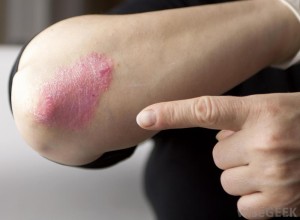 For people with psoriasis, suffering from painful symptoms like inflamed, flaking and red skin is not pleasant. The chronic skin condition is due to an overactive immune system that can be triggered by a number of internal and external factors. Many Western treatments include steroid creams and oral medications that come with a slew of unwanted side effects.
For people with psoriasis, suffering from painful symptoms like inflamed, flaking and red skin is not pleasant. The chronic skin condition is due to an overactive immune system that can be triggered by a number of internal and external factors. Many Western treatments include steroid creams and oral medications that come with a slew of unwanted side effects.
Below are alternative treatments that are safe and natural and can help reduce symptoms of psoriasis, leading you back to better health.
1. Herbal Remedies
● Aloe Vera: The gel from this cactus plant can be used generously on your skin to reduce redness and scaling caused by psoriasis. Aloe vera can be found in almost any grocery or health store.
● Tea Tree Oil: Tea tree oil is thought to have antiseptic properties. It can sooth irritated skin or scalp and can be applied daily.
● Turmeric: Turmeric has strong anti-inflammatory and antioxidant properties. Because of this, turmeric has been found to reduce psoriasis and psoriatic arthritis flares. Turmeric can be found in pill form as well as powder form to be added to food.
● Dead Sea Salts: Soaking in a bath with Dead Sea salts or Epsom salts can remove scaly skin and reduce itching. It is recommended that you use warm water and stay in the tub for 15 minutes.
2. Mindfulness/Meditation
Mindfulness and meditation practices have been found to be effective in people suffering with chronic pain like psoriasis.
Meditation is the practice of focusing your attention on the moment and ridding yourself of all external thoughts you may be having. This can lead to a state of relaxation and calmness, bringing balance to your body and mind.
Mindfulness, which is practiced in meditation, includes becoming completely aware of your body, externally and internally. This can be a seated meditation that is focused on awareness of mind, body and senses.
3. Exercise
Not only is exercise important to maintain overall health and wellness, it is especially beneficial for people with psoriasis.
Because people with psoriasis have an increased risk of heart disease and type 2 diabetes, regular exercise can prove very helpful.
Many find it hard to exercise because of the chronic pain associated with psoriasis. Exercise programs in the water prove to be an effective alternative that is easier on the body and still allows you to build endurance and strength.
Other simple ways to fit more exercise into your day include short walks, taking the stairs and stretching.
4. Massage
Seeing a licensed massage therapist can help reduce symptoms and pain. Massage promotes the function of muscle and connective tissue and can increase relaxation and circulation in the body.
5. Acupuncture
Acupuncture has been proven to be effective in minimizing chronic pain in patients. Acupuncture takes a holistic approach with the body and symptoms you may be experiencing. By returning the body to its natural flow, acupuncture can help reduce the intensity of symptoms of psoriasis.
Home Remedies:
● Soak a towel in cold milk and apply to affected area to relieve itching.
● Add ½ cup ground oatmeal into a warm bath.
● Rub the affected area with the inner side of a banana peel.
● Apply aloe vera gel to affected area.
● Cut several fresh willow branches into 3-inch stems and place in a pot with plenty of water. Bring to a boil, then simmer until water becomes black. Wash affected areas with the water three times daily.
● Slice 15 water chestnuts and soak in 3 oz. of rice vinegar crush and store in a sealed jar. Apply the paste to affected area and cover with gauze. Change daily.
Sources:
https://www.psoriasis.org/about-psoriasis
Save Your Summertime Skin
 Now is the time of year when the sun becomes irresistible. As tempting as it is to spend as much time as possible in the warmth of the sun, there are a few precautions to take to protect your skin from harmful rays.
Now is the time of year when the sun becomes irresistible. As tempting as it is to spend as much time as possible in the warmth of the sun, there are a few precautions to take to protect your skin from harmful rays.
Our skin is the largest organ in the body. It reflects our health and age. Today, there’s much concern about sunbathing leading to an increase in skin damage and skin cancer.
Excessive exposure to ultraviolet rays can increase the production of free radicals that can adversely affect the integrity of collagen in the skin. Over time, our skin becomes wrinkled, cracked, aged, and brittle. For smokers, the effects are multiplied.
Research suggests that skin cancer is cumulative over a lifetime. It begins with overexposure and serious sunburns during childhood.
We can’t live without the sun. Our bodies require sunlight in order to manufacture Vitamin D needed for calcium absorption, among other things. So, we shouldn’t hide from our shining star. Here are a few helpful tips and precautions to take when you’re soaking in the sun this summer.
Use sunscreen – Choose a sunscreen with a high SPF number for greater protection. Apply it onto your skin 15 minutes before you go outside. Don’t forget your nose, ears, and neck.
Time is key – Avoid sun exposure when the sun is at its highest peak in the sky, typically from about 11:00 am – 4:00 pm.
Gear up – Wear a hat with a wide brim, t-shirt, and sunglasses that filter ultraviolet rays.
Drink up – By keeping your body hydrated you can avoid dehydration and provide moisture for the skin to prevent dryness, cracking, and aging.
Pop a pill – Vitamins such as A, E, and some antioxidants help prevent skin damage from the inside. Cod Liver oil and Flaxseed oil have also been used to support skin health.
Brush it off – Before you take a shower, use a dry skin brush. This can open pores and slough off dead skin, allowing your skin to breathe easily and work more efficiently.
Keep healthy – Some medications we take may have reactions and side effects when we’re exposed to sunlight. Acupuncture may be able to provide an alternative to these medications, keeping you healthy, safely and naturally.
If you want to enjoy the sun this summer season and not worry later, practice good sun sense.
You and your skin deserve it!
